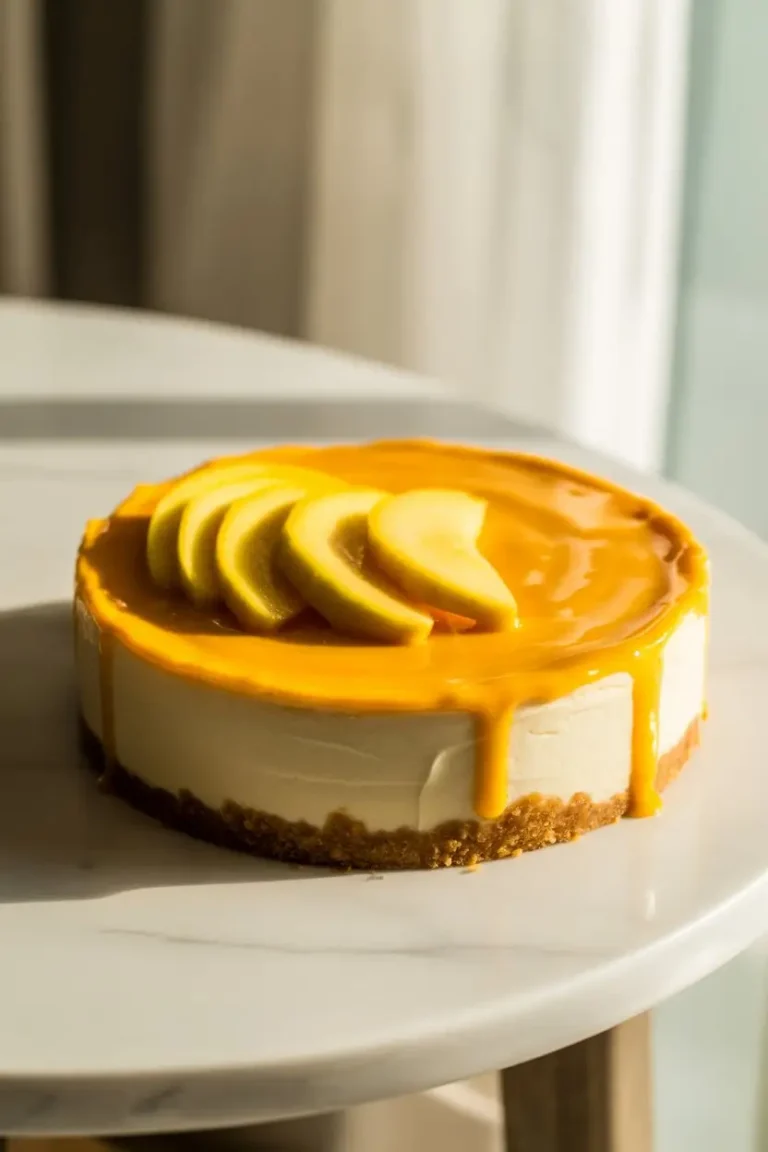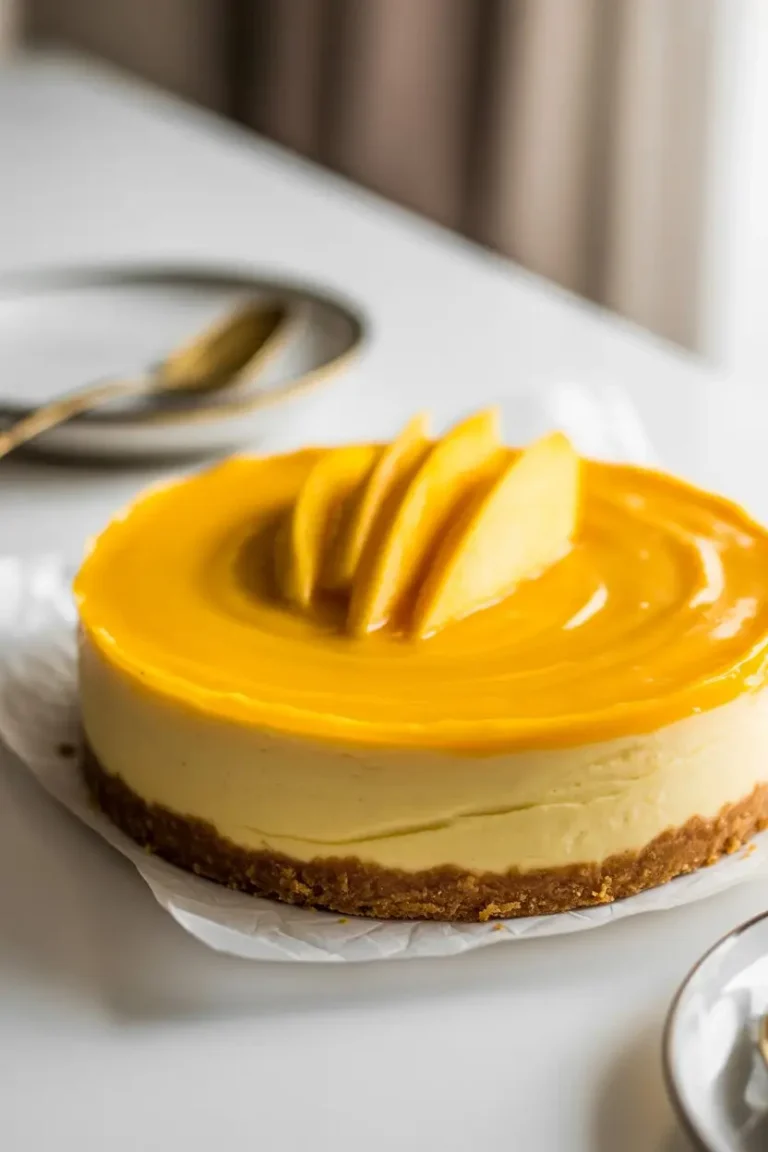Sunshine in a slice. That’s the promise of mango cheesecake, a creamy dessert where ripe mangoes meet tangy cream cheese and a buttery crust. If you crave a tropical dessert that’s impressive yet approachable, this guide will help you master it, whether you bake it or go no-bake.
Introduction
How often do you see a dessert spike by more than 200% in search interest during summer months? According to Google Trends, queries for mango cheesecake surge globally from June through August, right when peak fruit sweetness aligns with warm-weather cravings. This recipe proves why mango cheesecake deserves that attention: it’s lush, balanced, and far less fussy than most people assume.
We’ll cover a classic baked approach and an eggless, no-bake version, both designed to deliver a silky texture, vibrant color, and bright mango flavor. Expect pro tips on stabilizers, water baths, and set times. Your mango cheesecake will look like it came from a pastry case and taste even better.
Ingredients List
The ingredient lineup below keeps flavor at the center and offers smart swaps for different diets and preferences. Use ripe, fragrant mangoes (Ataulfo, Kesar, or Alphonso are top picks) for a sweet, floral puree that makes the cheesecake sing.
For the crust, you’ll create a crisp, buttery base that contrasts beautifully with the creamy filling.
- Graham cracker crumbs, 1½ cups (150 g)
- Granulated sugar, 2 tablespoons (25 g)
- Unsalted butter, melted, 6 tablespoons (85 g)
- Pinch of fine sea salt
For the filling and topping, here’s a flexible list that supports both baked and no-bake styles.
- Cream cheese: 24 oz (680 g), full-fat, room temperature; Philadelphia is reliable
- Sour cream: 1 cup (240 g) for tang and tenderness
- Heavy cream: ½ cup (120 ml) for silkiness
- Mango puree: 1½ cups (360 ml), strained for a smooth texture
- Granulated sugar: ¾ cup (150 g)
- Eggs: 3 large, room temperature for baked version
- Gelatin or agar: 2½ teaspoons powdered gelatin or 2 teaspoons agar agar for no-bake
- Cornstarch: 1½ tablespoons for baked stabilization
- Lime juice: 1 tablespoon to brighten the mango
- Vanilla extract: 1 teaspoon
- Fine sea salt: ¼ teaspoon to sharpen flavors
- Mango coulis: ½ cup for glossy finish, optional
- Coconut flakes: lightly toasted, optional garnish
Substitution ideas abound: swap grahams for digestive biscuits, almond flour, or gluten-free cookies; replace sour cream with Greek yogurt or mascarpone; and use coconut cream for dairy-leaning flavor. For an eggless cheesecake, go with the no-bake path using gelatin or agar as your stabilizer.
Timing
If you factor in chilling, cheesecake is a plan-ahead dessert. The win: almost all of that time is hands-off.
- Prep time: 25 minutes of active work
- Bake time (baked version): 60 to 70 minutes
- Chill time: 6 to 8 hours, ideally overnight
- Total time, baked: about 8 hours 45 minutes
- Total time, no-bake: about 6 hours 30 minutes That’s roughly 15 to 25% less active time than many fruit cheesecakes that require dual baking steps or elaborate glazes.
Step-by-Step Instructions
1. Prep the pan and oven
Line the bottom of a 9-inch springform pan with parchment and lightly grease the sides. For baked cheesecake, heat the oven to 325°F (163°C). Place a kettle of water on to boil if you plan to use a water bath. Room-temperature dairy will prevent lumps and deliver a smooth fill.
2. Make the crust
Stir graham crumbs, sugar, and salt. Add melted butter and mix until it resembles damp sand. Press firmly into the pan’s base, pushing a little up the sides. Use a flat-bottomed glass to compact it evenly. For baked cheesecake, bake the crust at 325°F for 10 minutes. For no-bake, chill the crust for 20 minutes until set.
3. Blend the mango puree
Peel and dice ripe mangoes, then puree until very smooth. Strain through a fine sieve to remove fibers. You want a silk-like texture so the filling doesn’t feel pulpy. Stir in lime juice to keep the color vivid and flavor bright.
4. Mix the baked filling
Beat cream cheese on medium-low until creamy, about 2 minutes. Add sugar and salt, scraping the bowl. Beat in sour cream and vanilla. Whisk cornstarch into the mango puree to prevent clumps, then blend the puree into the batter. Add eggs one at a time on low speed, just until combined. Overmixing adds air and can cause cracks.
5. Bake with a gentle heat strategy
Wrap the springform pan base with two layers of foil. Set the pan inside a larger roasting pan. Pour the batter over the crust. Add hot water to the roasting pan to come halfway up the side of the springform. Bake 60 to 70 minutes, until edges are set and the center has a slight wobble about 2 inches across. Turn off the oven, crack the door, and let it rest for 45 minutes.
6. No-bake option with gelatin or agar
Bloom 2½ teaspoons powdered gelatin in 3 tablespoons cold water for 5 minutes. Gently heat the bloomed gelatin until dissolved and clear, then whisk into the mango puree. For agar agar, simmer 2 teaspoons agar with 5 tablespoons water for 2 minutes, stirring, then whisk into the puree. Beat cream cheese, sugar, salt, sour cream, and vanilla until smooth. Fold in heavy cream and the stabilized mango puree. Pour over the chilled crust and smooth the top.
7. Chill for the perfect set
Baked: Remove the springform from the water bath, discard foil, and cool to room temperature. Chill at least 6 hours, preferably overnight. No-bake: Chill at least 6 hours until fully set. Agar sets more quickly than gelatin, but longer chilling improves sliceability and flavor.
8. Add a glossy mango finish
For a coulis, simmer ¾ cup mango puree with 2 tablespoons sugar and a squeeze of lime for 2 to 3 minutes until slightly thickened. Cool, then spread over the set cheesecake. Garnish with thin mango slices, lime zest, or a sprinkle of toasted coconut for fragrance and texture.
9. Slice cleanly
Warm a sharp knife in hot water, wipe dry, and cut. Clean and rewarm between slices. This is the difference between café-style slices and messy wedges.
10. Flavor variations that work
Fold in toasted coconut flakes for a hint of nuttiness. Add a splash of passion fruit puree to the coulis for tang. For a New York style vibe, use a touch more sour cream and vanilla, and swirl in a ribbon of mango instead of tinting the entire batter.
Nutritional Information
The values below are approximate per slice for a 12-slice cheesecake with baked method, without coulis. No-bake versions with gelatin are similar; agar-based sets shave a few calories.
| Nutrient | Amount per slice |
|---|---|
| Calories | 420 |
| Total fat | 29 g |
| Saturated fat | 17 g |
| Carbohydrates | 34 g |
| Fiber | 1 g |
| Sugars | 26 g |
| Protein | 7 g |
| Sodium | 240 mg |
| Cholesterol | 130 mg |
| Vitamin C | 18% DV |
Data note: using Greek yogurt in place of sour cream typically reduces total calories by around 30 to 40 per slice and increases protein by about 2 g.
Healthier Alternatives for the Recipe
If you want the same lush texture with a lighter profile, swap half the cream cheese with 2% Greek yogurt and add 1 extra teaspoon cornstarch to the baked version for stability. The flavor stays clean, and the mouthfeel remains rich.
Gluten-free crusts work beautifully using almond flour and shredded coconut bound with butter and a teaspoon of honey or maple syrup. Press firmly and par-bake for 8 minutes to keep it crisp. Oat cookie crumbs are another friendly option with a rustic texture.
For a lower-sugar approach, reduce granulated sugar by 15% and use an extra tablespoon of mango puree to boost perceived sweetness. Ripe mangoes carry plenty of natural sugar and aroma, so the cheesecake still tastes indulgent.
Prefer dairy-leaning tropical notes? Use coconut cream for half of the heavy cream in the no-bake version. It pairs naturally with mango and introduces a subtle aroma without taking over.
Serving Suggestions
Serve chilled, not icy. Ten minutes on the counter softens the fats just enough to release aroma and achieve that satin texture. A spoonful of mango coulis or a quick lime syrup elevates each slice without extra effort.
For a plated dessert, add crushed pistachios or macadamias for crunch, and a thin stripe of coconut cream. If you love contrast, a small scoop of salty coconut sorbet makes the mango cheesecake shine even more.
Entertaining outdoors? Keep the cheesecake on a chilled marble slab or a tray over ice packs. Ripe mango, a faint citrus finish, and creamy tang make it a summer dessert people remember.
Common Mistakes to Avoid
Before you bake or chill, review these quick pitfalls so your mango cheesecake sets perfectly and slices clean.
- Overmixing the batter
- Skipping room-temperature dairy
- Baking without a water bath
- Using unstrained mango puree
- Rushing the chill time
- Cutting with a cold, dull knife
- Overbaking until fully firm in the center
- Storing uncovered in the fridge
Storing Tips for the Recipe
Cheesecake loves the fridge, but it hates moisture swings. Keep it covered: either a domed cake lid or an inverted bowl over the pan keeps condensation off the surface. Store up to 5 days. The coulis can be kept separately and spooned over slices to maintain a glossy finish.
Planning ahead for an event? Wrap the cooled, unsliced cheesecake tightly in two layers of plastic and one layer of foil, then freeze up to 2 months. Thaw overnight in the fridge, remove the wrap, and dry the surface with a clean paper towel before glazing or garnishing. Slices freeze well too. Wrap individually for easy desserts.
Quick recap in 50 words: Cream a smooth base, balance with bright mango and lime, bake gently or set with gelatin or agar, then chill until sliceable. Ready to try it? Make this mango cheesecake today, then share your rating or a comment, and subscribe to get new dessert guides and seasonal recipe ideas.
FAQs
Is mango cheesecake better baked or no-bake?
Both deliver great results. Baked cheesecake is denser and custardy, with a classic New York style feel. No-bake is lighter and silkier, ideal for warm kitchens or eggless needs. If you prefer a firm slice with defined edges, choose baked; if you like mousse-like texture, go no-bake.
Which mangoes are best for cheesecake?
Go for ripe, non-fibrous varieties with intense aroma. Ataulfo, Kesar, and Alphonso are standouts. If using frozen mango, thaw completely, puree, and strain. Canned Kesar or Alphonso pulp works well too and offers consistent sweetness.
Do I need a water bath for baking?
A water bath, or bain marie, reduces temperature swings and lowers the risk of cracking. If you skip it, bake at 300°F, place a pan of hot water on a lower rack to add humidity, and avoid overbaking. Let the cheesecake cool gradually in the oven with the door cracked.
Can I make it without gelatin?
Yes. For an eggless, no-bake set, use agar agar. Simmer with water to activate, then whisk into the puree. Agar sets more firmly than gelatin, so use slightly less by weight and avoid over-chilling or the texture can become too firm.
How do I prevent cracks on top?
Use room-temperature ingredients, avoid overmixing, bake gently with a water bath, and cool slowly. A slight wobble in the center means it’s done. Even if a small crack appears, a thin mango coulis or fruit slices create a flawless finish.
What size springform pan should I use?
A 9-inch pan is standard for the quantities listed. An 8-inch pan will yield a taller cheesecake; increase bake time by 5 to 10 minutes. For a 10-inch pan, reduce bake time slightly and consider scaling the filling by 10% to maintain height.
Can I scale this recipe for mini cheesecakes?
Yes. Use a muffin tin with liners and press a tablespoon of crust into each. Bake the crusts for 5 minutes, then fill and bake about 18 to 20 minutes, or chill for 2 to 3 hours for a no-bake set. Great for parties and portion control.
Looking for more ideas after your mango cheesecake? Try variations with passion fruit or pineapple, or swap in a coconut-almond crust for a nutty twist.
Print
Mango Cheesecake: A Tropical Delight to Savor
A creamy, tropical no-bake mango cheesecake with a smooth texture and bright mango flavor. Perfect for summer or any occasion!
- Total Time: 25
- Yield: 10 servings
Ingredients
Cream cheese: 24 oz (680 g), full-fat, room temperature; Philadelphia is reliable
Sour cream: 1 cup (240 g) for tang and tenderness
Heavy cream: ½ cup (120 ml) for silkiness
Mango puree: 1½ cups (360 ml), strained for a smooth texture
Granulated sugar: ¾ cup (150 g)
Eggs: 3 large, room temperature for baked version
Gelatin or agar: 2½ teaspoons powdered gelatin or 2 teaspoons agar agar for no-bake
Cornstarch: 1½ tablespoons for baked stabilization
Lime juice: 1 tablespoon to brighten the mango
Vanilla extract: 1 teaspoon
Fine sea salt: ¼ teaspoon to sharpen flavors
Mango coulis: ½ cup for glossy finish, optional
Coconut flakes: lightly toasted, optional garnish
Instructions
Line the bottom of a 9-inch springform pan with parchment and lightly grease the sides. For baked cheesecake, heat the oven to 325°F (163°C). Place a kettle of water on to boil if you plan to use a water bath. Room-temperature dairy will prevent lumps and deliver a smooth fill.
2. Make the crustStir graham crumbs, sugar, and salt. Add melted butter and mix until it resembles damp sand. Press firmly into the pan’s base, pushing a little up the sides. Use a flat-bottomed glass to compact it evenly. For baked cheesecake, bake the crust at 325°F for 10 minutes. For no-bake, chill the crust for 20 minutes until set.
3. Blend the mango pureePeel and dice ripe mangoes, then puree until very smooth. Strain through a fine sieve to remove fibers. You want a silk-like texture so the filling doesn’t feel pulpy. Stir in lime juice to keep the color vivid and flavor bright.
4. Mix the baked fillingBeat cream cheese on medium-low until creamy, about 2 minutes. Add sugar and salt, scraping the bowl. Beat in sour cream and vanilla. Whisk cornstarch into the mango puree to prevent clumps, then blend the puree into the batter. Add eggs one at a time on low speed, just until combined. Overmixing adds air and can cause cracks.
5. Bake with a gentle heat strategyWrap the springform pan base with two layers of foil. Set the pan inside a larger roasting pan. Pour the batter over the crust. Add hot water to the roasting pan to come halfway up the side of the springform. Bake 60 to 70 minutes, until edges are set and the center has a slight wobble about 2 inches across. Turn off the oven, crack the door, and let it rest for 45 minutes.
6. No-bake option with gelatin or agarBloom 2½ teaspoons powdered gelatin in 3 tablespoons cold water for 5 minutes. Gently heat the bloomed gelatin until dissolved and clear, then whisk into the mango puree. For agar agar, simmer 2 teaspoons agar with 5 tablespoons water for 2 minutes, stirring, then whisk into the puree. Beat cream cheese, sugar, salt, sour cream, and vanilla until smooth. Fold in heavy cream and the stabilized mango puree. Pour over the chilled crust and smooth the top.
7. Chill for the perfect setBaked: Remove the springform from the water bath, discard foil, and cool to room temperature. Chill at least 6 hours, preferably overnight. No-bake: Chill at least 6 hours until fully set. Agar sets more quickly than gelatin, but longer chilling improves sliceability and flavor.
8. Add a glossy mango finishFor a coulis, simmer ¾ cup mango puree with 2 tablespoons sugar and a squeeze of lime for 2 to 3 minutes until slightly thickened. Cool, then spread over the set cheesecake. Garnish with thin mango slices, lime zest, or a sprinkle of toasted coconut for fragrance and texture.
9. Slice cleanlyWarm a sharp knife in hot water, wipe dry, and cut. Clean and rewarm between slices. This is the difference between café-style slices and messy wedges.
10. Flavor variations that workFold in toasted coconut flakes for a hint of nuttiness. Add a splash of passion fruit puree to the coulis for tang. For a New York style vibe, use a touch more sour cream and vanilla, and swirl in a ribbon of mango instead of tinting the entire batter.
Notes
For maximum mango flavor, use Alphonso or Ataulfo mangoes.
If using agar agar, heat it with the mango purée for 2 minutes to activate.
Add a pinch of salt to enhance sweetness.
Chill overnight for perfect slices.
- Prep Time: 25
- Category: Dessert
- Cuisine: International


